More Bushmasters as Albo says Australia will stand with Ukraine
Australian Prime Minister Anthony Albanese and Ukrainian President Volodymyr Zelenskyy are planning to meet on the sidelines of the NATO Summit. See why.
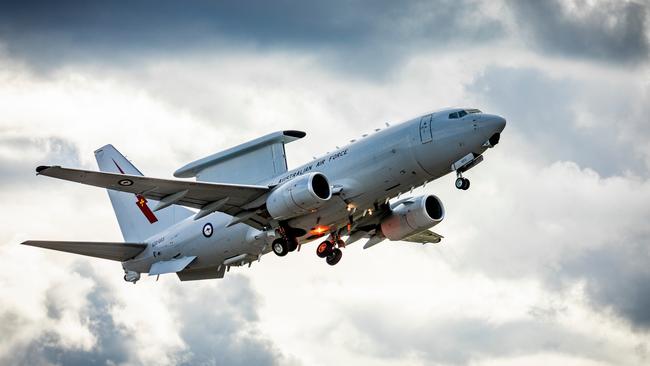
World
Don't miss out on the headlines from World. Followed categories will be added to My News.
Prime Minister Anthony Alabanese will give Ukraine an extra 30 Bushmasters after telling Ukraine’s President Volodymyr Zelensky that Australia “will remain with you for as long as this takes for you to restore your sovereignty and repel this brutal invasion’’.
Mr Albanese said providing the latest batch of Bushmasters would bring the tally of the vehicles being used by grateful Ukrainiain soldiers to 120.
The vehciles are in addition to recent commitments to provide an RAAF Wedgetail aircraft and 100 associated military personnel to service the plane, based in Germany.
So far the Australian government has provided military assistance of over $710million and the total support, including humanitarian aid, to $890m.
“Mr Zelensky is very grateful for support Australia has given,. The Ukrainian struggle is very difficult, they would like as much support as possible across a range of assets, “ Mr Albanese said.
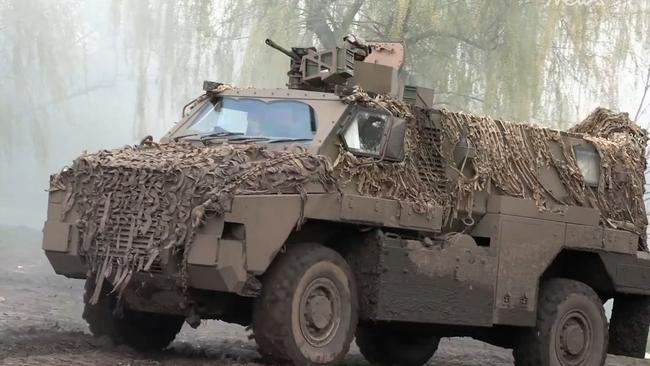
“This (supply of extra Bushmasters) is very positive, we know it makes a difference.”
Mr Albanese said there were issues of supply with providing any of the light armoured four-wheel-drive Hawkies, which Ukraine had previously requested.
“We have explained what the issues were; we want to make sure we provide equipment that maximises the positive difference it will make,’’ he said.
“We know the Bushmaster can do that.’’
Mr Albanese spent 15 minutes with the Ukrainian leader on the sidelines of the NATO summit in Vilnius on Wednesday, telling him “we will remain with you for as long as this takes for you to restore your sovereignty and repel this brutal invasion’’.
Australia’s latest tranche of equipment comes after Australia is preparing to send the Wedgetail to Europe in October. It is considered the most sophisticated surveillance craft in the world, and will help secure the logistic supply lines going into Ukraine.
Other countries have also reached deep into the armoury. France is to provide Ukraine with new long range missiles and Germany said it would provide more tanks, Patriot missile defences and armoured vehicles worth another 700 million euros.
France, Germany, the United States and the United Kingdom are to ameliorate Mr Zelensky’s disappointment about NATO not providing an immediate pathway to join the NATO alliance with a security guarantee. This will include extended military provisions well into the future to deal with Russia even long after the current war is concluded.
Mr Zelensky told Mr Albanese: “Australia stands shoulder to shoulder with our people and we appreciate that support.”
Mr Albanese has also explained to him that Australia would continue to impose sanctions on Russia and that “recently we had an issue with a Russian Embassy in Australia and we took action to ensure that they weren’t in a position which was inappropriate (to be) so close to our Parliament House.”
ALBO TO MEET WITH ZELENSKY
Anthony Albanese’s still hopes to meet with the Ukrainian president on Wednesday on the final day of the NATO summit in Lithuania, after a breakthrough has seen alliance members agree on a ‘’clear path” for Ukraine’s NATO membership.
The NATO members also discussed a “coercive” China and the risk that poses to security across Europe and the Atlantic.
“China is not our adversary, and we should continue to engage,” NATO secretary general Jens Stoltenberg said, but warned “Beijing’s increasing assertiveness affects our security”as well as challenging the rules-based international order.
However on Tuesday the focus was on a three prong deal which will see NATO fund the transition of the Ukrainian armed forces equipment from Soviet-era to NATO standards and help rebuild Ukraine’s security and defence sector, covering critical needs like fuel, de-mining equipment, and medical supplies.
Allies also agreed to establish the new NATO-Ukraine Council, which will meet in Vilnius on Wednesday. Allies reaffirmed that Ukraine will become a member of NATO, and agreed to remove the lengthy requirement for a Membership Action Plan. “This is a strong package for Ukraine, and a clear path towards its membership in NATO,” said Mr Stoltenberg.
Before the NATO plan was announced, Ukrainian president Volodymyr Zelenskyy had tweeted that current discussions at the Nato Summit were “absurd” and there were fears the pre-lunch meeting with Australia may be a late casualty.
Mr Zelenskyy had warned NATO that Ukraine deserves respect, expressing fears that there had been no time frame established for Ukraine’s membership of the alliance.
Mr Zelenskyy believed that NATO was opening the door to bargain Ukraine’s membership in NATO in any negotiations with Russia.
He warned that for Russia this situation gave the Kremlin “motivation to continue it’s terror”.
But Ukrainian delegation officials told The Australian that Mr Zelenskyy wanted to personally thank prime minister Anthony Albanese for Australia’s new commitment of a six month deployment of the sophisticated Wedgetail reconnaissance plane and 100 military personnel to protect the supply line of military weapons into Ukraine.
Mr Albanese said Mr Zelenskyy was “such a strong advocate for his people, and such an extraordinary leader: he is an inspiration to the people of Ukraine’’.
Mr Zelenskyy arrived in Lithuania and attended a 5000-strong rally of Lithuanians and Ukrainian refugees in the centre of Vilnius on Tuesday night amid tight security.
He was mobbed by supporters draped in the colours of the Ukrainian flag. “I will speak Ukrainian, the language of our heroes and war heroes,’’ he told the enthusiastic crowd as he was joined on stage by wife Olena, Lithuanian President Gitanas Nauseda and his wife Diana.
ALBO-SUNAT CRICKET BANTER AT NATO
Australian prime minister Anthony Albanese met with British prime minister Rishi Sunak with the two sledging each other about cricket during a brief “stop and chat” on the sidelines of the opening day of the Nato Summit in Vilnius on Tuesday.
Conveniently, Mr Albanese had a photo to hand about the controversial stumping of Jonny Bairstow at Lord’s in the second test, while Mr Sunak had a picture of the third test win by the England team.
Mr Albanese then produced a piece of A4 paper with 2-1 Australia, the current ashes scoreline with two tests remaining. But Mr Sunak bowled over Mr Albanese with the final word, noting “I didn’t bring my sandpaper with me’’, a reference to the notorious cheating incident by the Australian team in South Africa in 2018.
The brief get together was a moment of lighthearted banter before Mr Albanese conducted back to back bilateral meetings with various world leaders. He said Australia has to “be a shaper of the future rather than just accepting it’’.
He added: “the best way to be engaged for Australia is to have a seat at the table and to have a say.”
Mr Albanese met with the Portugal prime minister Antonio Costa who promised him support with the EU-Australia free trade deal, and affirmed a shared support of the stability and prosperity of Timor-Leste. A meeting with US senators and congress members gave the prime minister hope that the technology transfer in future US legislation will ensure the AUKUS interoperability is “seamless”. And a meeting with the French president Emmanuel Macron was centred around the EU free trade deal negotiations which have stalled, in part because of French protectionist policies for its farming sector.
Mr Albanese said he repeated an open invitation for Mr Macron to visit Australia.
“I put to him Australia’s case, which is we want a better deal than was currently offered on beef and on sheep meat,” Mr Albanese said.
“ And we’ll continue to argue the case for a free trade agreement in the interests of both Australia and Europe. But we won’t just sign up to a deal for the sake of it.”
WHY ZELENSKYY IS FURIOUS WITH NATO
Ukrainian president Volodymyr Zelensky expressed fury that Ukraine may not be invited to join NATO, describing the current discussions at the Nato Summit as “absurd”.
He said Russia would “continue its terror”, as NATO’s big four – the US, UK, France and Germany – want to provide Ukraine with security guarantees instead of membership which could be used as a future bargaining chip
On Twitter, Zelensky said: “We value our allies. We value our shared security. And we always appreciate an open conversation. Ukraine will be represented at the NATO summit in Vilnius. Because it is about respect.
“But Ukraine also deserves respect. Now, on the way to Vilnius, we received signals that certain wording is being discussed without Ukraine.
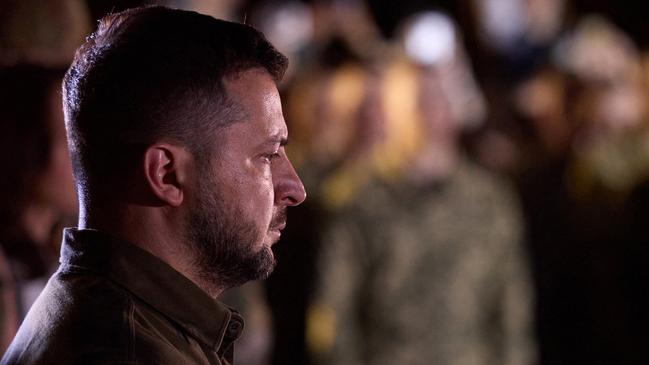
“And I would like to emphasise that this wording is about the invitation to become NATO member, not about Ukraine’s membership.
“It’s unprecedented and absurd when time frame is not set neither for the invitation nor for Ukraine’s membership. While at the same time vague wording about “conditions” is added even for inviting Ukraine.
“It seems there is no readiness neither to invite Ukraine to NATO nor to make it a member of the Alliance.
“This means that a window of opportunity is being left to bargain Ukraine’s membership in NATO in negotiations with Russia. And for Russia, this means motivation to continue its terror.
“Uncertainty is weakness. And I will openly discuss this at the summit.”
US president Joe Biden said he supports the proposed NATO language, which addresses providing ongoing military support.
AUSTRALIA STANDS STRONGLY WITH UKRAINE: ALBO VOWS
Jens Stoltenberg has brushed off “supreme fool” criticisms of his leadership of the NATO alliance as Prime Minister Anthony Albanese emphasised that Australia would be engaged in supporting NATO efforts in Ukraine “for as long as necessary and to the best of our capacity’’.
Australia has deepened its partnership with the countries of the alliance – now numbering 32 after Sweden has been admitted as a member – in areas of cyber and hybrid warfare.
Mr Stoltenberg said that Australia’s involvement in the NATO alliance was “really valued” because regional security is global.
“What happens in the Indo-Pacific region matters for, for NATO, what happens in Europe matters in the Asia Pacific,’’ he said, stressing how the Russian invasion of Ukraine had global implications.
“We are extremely grateful for Australia’s strong support of Ukraine, it really makes a difference every day,’’ he said.
Mr Stoltenberg showed no agitation about the remarks of former prime minister Paul Keating who criticised Mr Stoltenberg for trying to set up a regional NATO office in the Indo-Pacific in what was being perceived as an anti-China manoeuvre.
“Of all the people on the international stage the supreme fool among them is Jens Stoltenberg. Stoltenberg by instinct and by policy is simply an accident on its way to happen.” Mr Keating had said.
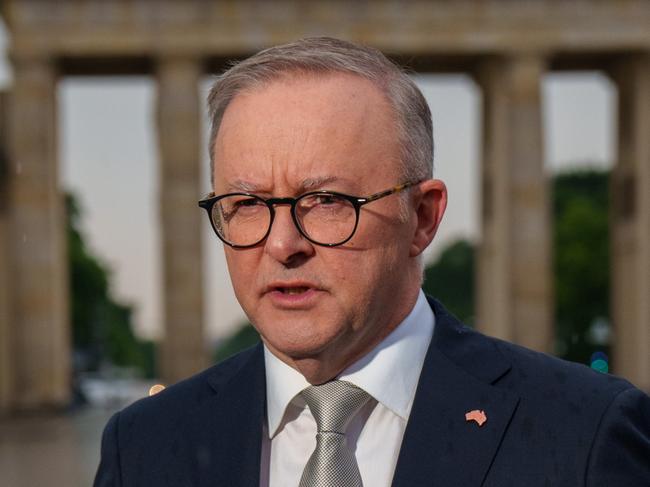
But Mr Albanese countered that view with an effusive welcome to Mr Stoltenberg on the opening day of the two day summit, congratulating him both on his reappointment for another year, noting “it is very well deserved” and on his leadership of NATO and what the alliance is doing to promote regional security.
Mr Albanese said Australia has been impacted by the war in Ukraine as well, despite the geographical distances, particularly in the areas of inflation and the economy, and he reiterated that Australia stands strongly with Ukraine.
Mr Albanese said that Australian would continue to work with NATO in areas like cyber, and he noted that Australia, like NATO, also recognised that climate change was a security threat.
“We will engage for as long as necessary and to the best of our capacity,’’ he vowed.
Within hours of the summit beginning, French president Emmanuel Macron announced he will provide Ukraine with long range Scalp missiles - the French equivalent of the effective Storm Shadow missiles - to support the current counteroffensive.
“I have decided to increase deliveries of weapons and equipment to enable the Ukrainians to have the capacity to strike deeply while keeping our doctrine to allow Ukraine to defend its territory,” said Mr Macron, who is wary of giving Ukraine unfettered membership of the NATO alliance.
Instead the United States, Britain, France and Germany are pushing for an “Israel-style” security guarantee whereby the four countries will continue to supply arms to Ukraine to defend itself. Talks over the wording and strength of the assurances were continuing on the first day of the summit.
The Russian ambassador to Belgium Alexander Tokovinin told the Russian news agency RIA that NATO’s embrace of Ukraine increases the risk of direct conflict between NATO members and Moscow. The Kremlin spokesman Dmitry Peskov criticised France’s offer of the longer-range missiles.
AUSTRALIA BOOSTS MILITARY AID FOR UKRAINE
In a significant step up of assistance to Ukraine, Australia has agreed to send one of its most sophisticated surveillance planes, the Royal Australian Air Force E-7A Wedgetail aircraft to Europe for six months to help protect key wartime logistics hubs.
The deployment of the Wedgetail, one of six operated by the No.2 Squadron at Williamtown, Newcastle, is to protect the uninterrupted delivery of key military and humanitarian assets into Ukraine via Poland and other neighbouring countries.
The Australian government said in a statement: “Along with ongoing military and humanitarian assistance support, this deployment reinforces that Australia remains a key partner in international endeavours to assist Ukraine repel Russia’s illegal and immoral attack. This deployment will help to ensure the continued and uninterrupted flow of military and humanitarian assistance into Ukraine.”
The plane, which can be refuelled mid-air, has the capacity to conduct 13 to 17 hour long missions and will be based in Germany under the coalitions’ partnership Operation Kudu and will operate in European airspace. Officials confirmed it will not operate over Ukraine.
But the aircraft’s highly sophisticated radars and electronic warfare self-protection measures means Australia could be intimately involved in coordinating weaponry and other deliveries into Ukraine.
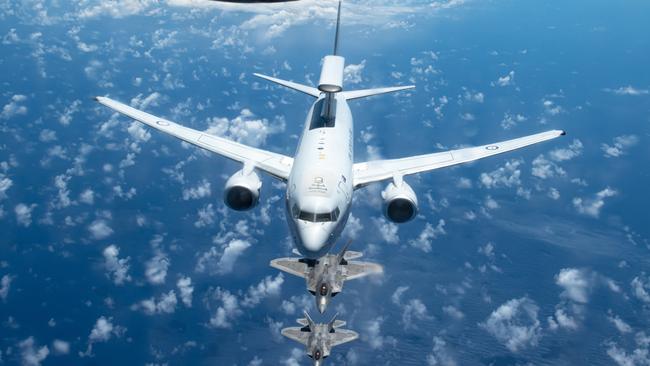
The RAAF says E-7A Wedgetail is one of the most advanced airspace battle management capabilities in the world with an “ability to coordinate a joint air, sea and land battle in real time.”
The deployment of the Wedge tail, one of six such planes in Australia, ramps up and expands Australia’s contribution to Ukraine, which has previously been limited to supplying various vehicles and ammunition in its battle with Russia.
Prime minister Anthony Albanese will attend the two day NATO Summit in Vilnius on Tuesday and Wednesday as part of the “Indo-Pacific Four” alongside Japan, New Zealand and South Korea to discuss security issues across both Europe and the Indo-Pacific and he hopes to meet with Ukrainian president Volodymyr Zelensky on the sidelines.
Last month the Albanese government pledged a fresh round of $110m support for Ukraine of 70 military vehicles, including 28 M113 armoured vehicles, 14 special operations vehicles, 28 MAN 40M medium trucks and 14 trailers; and a new supply of 105mm artillery ammunition. However the 31 member countries of NATO, and others, will be asked for further contributions as the Ukrainian offensive continues to progress more slowly than expected.
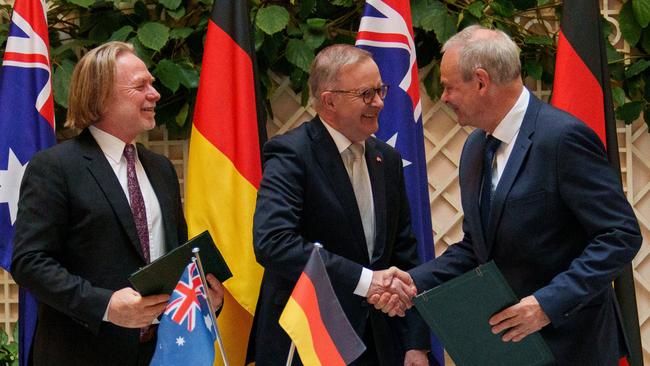
The Prime Minister rejected Mr Keating’s claim that NATO secretary-general Jens Stoltenberg was a “supreme fool” for comparing China‘s ambitions with Russia saying “Jens Stoltenberg is a friend of Australia. We need to remember the role that NATO is playing: there is a land war in Europe.
“This is a war about the international rule of law, about whether a large nation can seek to impose its will on a smaller nation. This is about national sovereignty. This is about the people of Ukraine, struggling to defend their democracy and their sovereignty.
“And Australia stands with the people and government of Ukraine. But we also support the extraordinary effort that NATO is showing, because this is a struggle.
“That is has implications for the whole world. I’m looking forward to my constructive engagement with NATO.”
Mr Albanese met with the German chancellor Olaf Scholz in Berlin on Monday at the German Chancellery after a morning press call in front of the Brandenburg Gate – the iconic symbol of Cold War divisions.
Their two hour long talks coincided with the deployment of 240 German paratroopers and marines to Australia for Exercise Talisman Sabre which involves Australia and the United States alongside troops from Fiji, France, Indonesia, Japan, Republic of Korea, New Zealand, Papua New Guinea, Tonga, the United Kingdom and Canada.
The involvement of 170 German paratroopers and 40 German marines is a big step up from previous engagements and signifies Germany’s interest and concern about China’s moves in the Indo-Pacific region.
German army chief Alfons Mais said the Indo-Pacific region was of extremely high importance in Germany and the European Union due to economic interdependencies.
Mr Scholz formally invited Australia to join the German-led Climate Club in recognition of Australia’s aggressive carbon emissions targets. The Climate Club was formed late last year and I led by Germany, which is desperately trying to decarbonise and find other sources of energy away from Russian oil and gas. The club is working to ensure an international standard of conditions for the decarbonisation of industry, investment in sustainable industrial technologies and expand “green” products, including green hydrogen.
“I see enormous opportunity for Australia to benefit from the shift to clean energy that’s occurring, including in countries like Germany,” Mr Albanese said.
Australia’s admission to the club is a recognition by others that Australia is aggressively seeking to reduce emissions and can help with the EU climate standards when it comes to trade.
That comes as the ailing Australian-EU free trade deal talks – bogged down in France and Ireland agribusiness protectionisms – will be ramped up in Brussels later this week.
Other members are Germany, France, Italy, Canada, United Kingdom, Japan, United States, European Union Council and Commission, Argentina, Chile, Colombia, Indonesia, Luxembourg, and the Netherlands.
Mr Albanese also invited Mr Scholz to visit Australia in an official visit next year.





